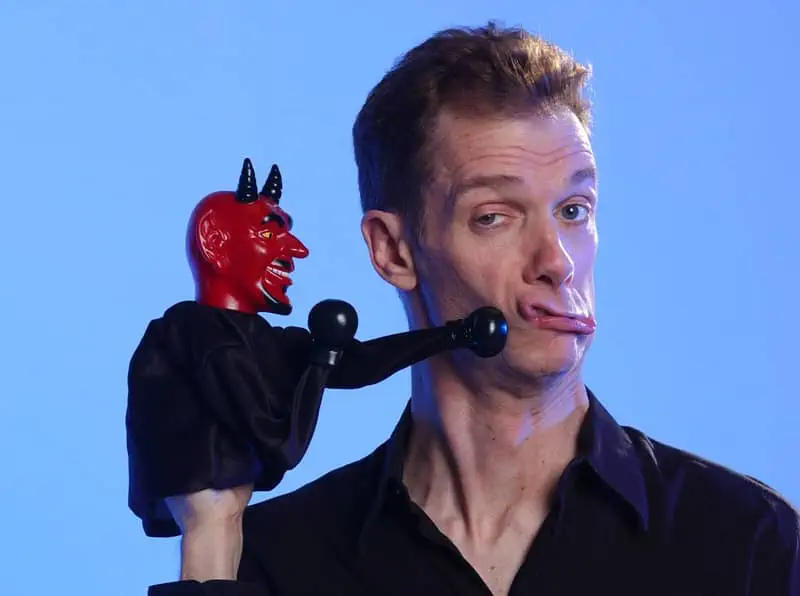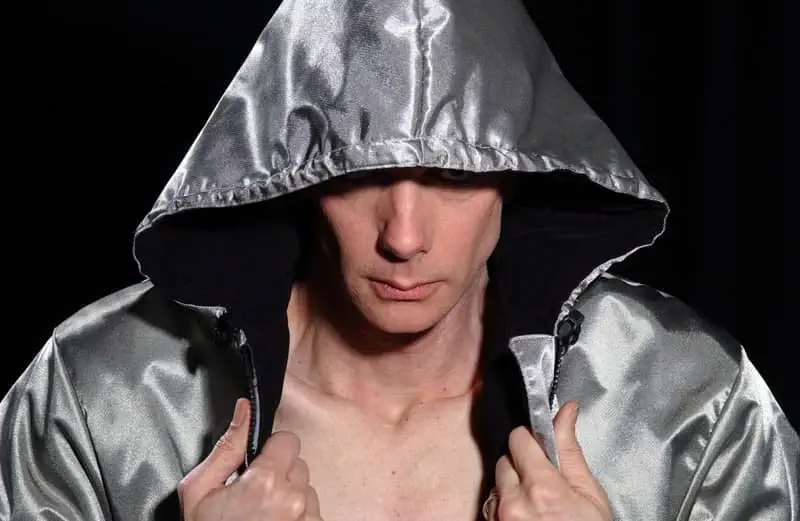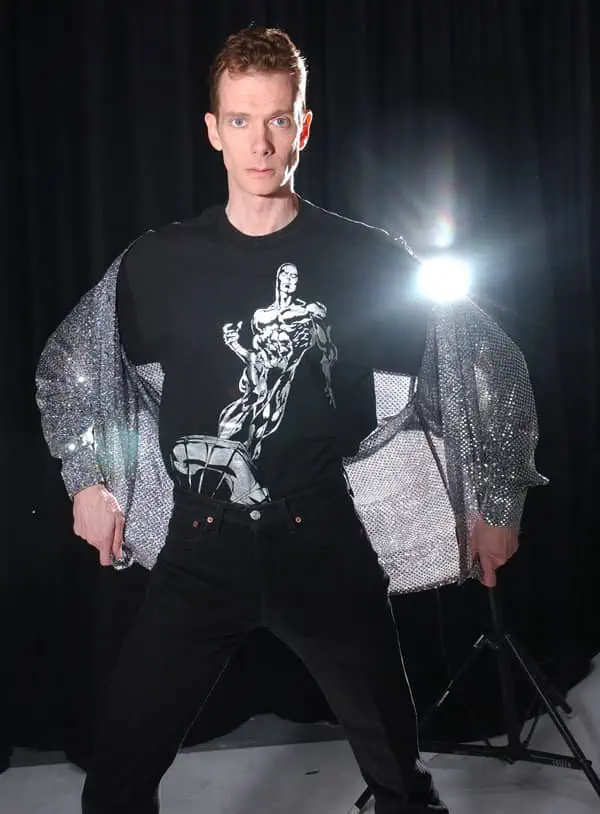
PHOTOGRAPH: ALBERT R. ORTEGA
It’s midnight and I’m in the living room of a small suburban house. The TV is chattering away in the background, casting a harsh, bluish glow over a middle-aged couple that I’ve never seen before. They’re on the couch, unmoving, and the woman’s head is cocked at an odd angle. I glance down at the cool, heavy object resting in my palm – a 9mm Smith & Wesson – before I hear the voice behind me, annoyed, frustrated, and cold-blooded: “You picked the wrong house again, Aarons.” I turn slightly and see one of the most eccentric-looking men I’ve ever laid eyes on. At 6’4” and a hair shy of 140 lbs., Doug Jones resembles nothing more than one of Tolkien’s tree-like Ents made flesh and blood. He grins, but it isn’t an I’m-so-happy-to-see-you grin: he’s holding a gun to my head.
With a casual shrug, as if to say, “C’est la vie,” he pulls the trigger. POP POP goes the gun and I’m sailing through the air, my body slamming into the foot of an oversized armchair. It’s a spectacular death. The high-pitched giggles that follow a moment later only ruin it slightly. I turn over to see Jones, bent double, attempting to stifle another outburst. “I’m sorry, it’s just that this is all so mean. I can’t believe I’m killing all these nice people!” he says by way of apology, nodding to the couple on the couch who have just miraculously resurrected. “Cut!” yells the director. Along with the rest of the crew, he’s trying not to laugh himself.
We’re on the set of “Greyscale,” an independent film being shot in Tulsa, Oklahoma, and Jones is playing Jamison, a remorseless mob hitman. The scene in question is a botched assassination, and Aarons (played by yours truly) has just become the unlucky recipient of Jamison’s wrath.
“I’m a very happy-go-lucky lover of all mankind as a person in real life,” Jones says as the crew resets for a second round of murdering. “So when I play a darker character, I have to tap into something that isn’t my natural way, and what I found was that I think human beings have the potential for all of these emotions. We have the full paint palette within us and it just depends on what we dip our brush into that day. There are people out there who are in prison right now who have dipped into the colors that some of us don’t ever dip into, but we have them, and we have the potential to do that.”
PHOTOGRAPH: ALBERT R. ORTEGA
Jamison is one of the rare roles where audiences will actually see the 48-year-old actor’s face. That’s because Jones’ pencil-thin visage is usually obscured by pounds of makeup, rubber latex and computer-generated imagery. Although you may recognize some of the characters Jones has brought to life – Abe Sapien, the Faun or the Silver Surfer (from the first and second “Hellboy” films, “Pan’s Labyrinth” and “Fantastic Four: Rise of the Silver Surfer”, respectively) – you probably wouldn’t recognize Jones himself. “I’m not usually the guy who has people hiding in his bushes and saying, ‘Will you love me forever and ever?’”
Jones’ road to becoming Hollywood’s go-to guy for roles involving complex makeup and prosthetics work began in the late ‘80s when he received “big break number one,” as he calls it. He was hired for McDonald’s Mac Tonight campaign, a job that required him to wear a large crescent moon for a head and jive around like an overzealous Burt Bacharach in front of a baby grand on top of a rotating Big Mac. “That was a job that marked me as a guy who can wear a big mechanical head, express [myself] physically and – most importantly to the creature effects and makeup people – I don’t complain. And if you don’t complain, they will tend to remember you.”
Jones’ can-do attitude and ability to emote underneath layers of latex caught the attention of director Guillermo del Toro in 1997 during the filming of “Mimic,” a sci-fi horror flick about man-eating insects that was the Mexican director’s first American studio picture. “I didn’t know it at the time, but that would be the biggest relational break of my career. I don’t know what I did, it was very simple what I had to do, but Guillermo del Toro remembered.” Five years later when del Toro was casting for his live-action adaptation of Hellboy (based on a popular comic about a large red demon who regularly saves the world), Jones was at the top of the list. He was a perfect fit as Abe Sapien, a rail-thin, hyper-intelligent, telepathic fish-man who serves as Hellboy’s sidekick. Although most actors primarily communicate using their eyes and facial expressions, the rigid blue mask enclosing Jones’ head made that impossible. Instead, Jones relied on body language and voice alone to craft the idiosyncratic, thoughtful character of Abe Sapien. Watching the performance, it’s amazing how much he is able to communicate with only his fingers.
For Jones, acting is a “head-to-toe experience,” and he’s a firm believer that when you’re hired to play a part, you’re hired to play the entire part – visually, audibly, everything. It was a rude awakening, then, when David Hyde Pierce was brought in to re-voice Abe Sapien in “Hellboy.” It wouldn’t be the first time, either, that part of Jones’ performance was replaced in post production by a studio. In 2007, despite having performed all of the Silver Surfer’s dialogue on camera, Laurence Fishburne was hired to dub over Jones.
When these instances are brought up, a quiet sadness enters Jones’ eyes; it’s easy to see this is a touchy subject for him. “I don’t believe any performance should be replaceable. When a studio makes a decision to replace part of [an actor’s] performance, be it visually with CG, or audibly with another actor’s voice, they might be doing a disservice to the part. I could be very one-sided in my belief because it was very personal to me, but I’m an actor who doesn’t want to see part of his performance taken away from him. I don’t think any actor wants to see that.”
Although Sapien and the Surfer were featured prominently in the marketing materials for both films, Jones’ name was notably absent. “When I’m told by directors, producers, and castmates that the voice I’ve given for the character is perfect – ‘Oh, wow, I love what you’re doing with it!’ – and then I go to see the movie and a big name voice is coming out of me, that doesn’t feel good. Of course it doesn’t. If I had some horrible speech impediment or an accent that they couldn’t replace or whatever, then that would make sense, but in these instances, that was not the case. When you have a baby in your hands, and someone’s ripping the legs off and putting different legs on, it’s like [Jones groans audibly] -- that was my baby a minute ago and now it looks different. But it made sense to them, they wanted different legs on there. But all of a sudden you have a Franken-baby.”
Jones is quick to point out that he’s not “a bitter actor who’s stomping his feet around. In film there’s a creative side to it, and at the big studio level where they’re spending millions and millions of dollars on a film, there has to be marketing involved. I know these decisions get made for reasons, reasons that I don’t need to completely understand. But when a story like this gets better is when a situation like “Hellboy II” comes around.” In 2008, for del Toro’s second installment in the comic book franchise, Jones was finally given the opportunity to voice the character himself. In the credits his name appears third behind Ron Perlman and Selma Blair. “This is just like the evolution that happens with any actor’s career: with time and with reputation, comes trust. And I think [the studio] finally does trust that they can keep my performance intact now.”
Seeing as Jones has become del Toro’s unofficial muse, will he be in any of the director’s upcoming films, perhaps in the title role of del Toro’s long rumored “Frankenstein” adaptation? “I have no definitive answer for you, but [Guillermo] was asked this very question on the red carpet of the Saturn Awards: [Jones lowers his voice and begins to, quite believably, impersonate del Toro] ‘Well, I’m sure I’ll be putting Doug through some sort of pain and torture. Let me say this: if I direct a hemorrhoid commercial, Doug Jones will be in it.’”
In between takes in an abandoned warehouse where Jamison is getting ready to go postal with a sledgehammer, Jones is in deep conversation with a young “Greyscale” crew member, graciously listening to whatever the youth has to say. This produces an immediate suspicion: why would a bona fide movie star used to multi-million dollar special effects blockbusters be so deeply attentive to a handful of college-age filmmakers in Oklahoma? Once you speak with Jones, however, you realize that it’s not an act: Jones genuinely cares for you, even if he barely knows you.
“My wife and I have never been able to have kids of our own. Physically, it’s impossible. The doctor checked. So we tend to unofficially adopt lots of twenty-somethings. I have a real soft spot in my heart for youth. It never seems like a mistake, it’s never forced, it’s never us out looking for them. They just show up in our lives and all of a sudden they’re sitting on our sofa and talking about life issues and dating and jobs and also about their faith in God and where is he and all of that. [It] gives us a sense of fulfillment and it really makes us think that maybe we were never meant to have our own kids. Maybe this is what God had in mind for us all along.”
Jones is confident about his faith, but not overbearing, more interested in forming personal relationships with those around him than proselytizing everything with a pulse. His attitude toward Hollywood is equally confident and stands in marked contrast to the opinions of many conservative Christian leaders, who often paint Hollywood as a modern-day Babylon. “Honestly, I have never felt shunned or been treated poorly because people found out that I was a Christian. I think that the key to all of this is not to come into the Hollywood workplace with any kind of agenda, to be either overt about your faith or covert about it. Overt being one who comes in with the agenda to change Hollywood overnight: ‘I’m going to witness to everyone; I’m gonna get on those movie productions and I’m gonna save everyone from Schwarzenegger to Julia Roberts.’ Coming in with that demeanor will make people recoil. It’s proven, they will. Then there’s the covert approach, which is, ‘I’ll [be silent] because I don’t want to be persecuted for my faith; I’ll start losing jobs.’ I think that if you’re just honest – if the subject matter comes up, speak about it freely. But if it doesn’t come up then maybe it’s not that time yet. Just be honest with the situation day by day.”
The wind viciously slaps at the flimsy metal siding of the warehouse, shaking the entire building. The temperature has plummeted below freezing in just a few short hours and Jones, visibly drained by the cold and wearing a blindingly shiny coat emblazoned with Fantastic Four on the breast, stands off to the side, head slumped slightly from an intense, 12 hour work day. Is he game for one last question? He looks up, smiles, and puts his arm around my shoulder. Of course he is.
What would you like to be remembered for?
“Of course, on the professional side, ‘He was an actor, he was in these various films and TV shows, etc.’ And film does make you immortal for a while; your image will live on. But I really want to be remembered as someone who had a light behind his eyes that made you ask why. And someone who, when they spent time with you, did you feel loved? I hope yes. Did you feel that you had my full attention? I hope yes. Did you leave my presence in better condition than when you entered it? And I hope yes.” PHOTOGRAPH: ALBERT R. ORTEGA



